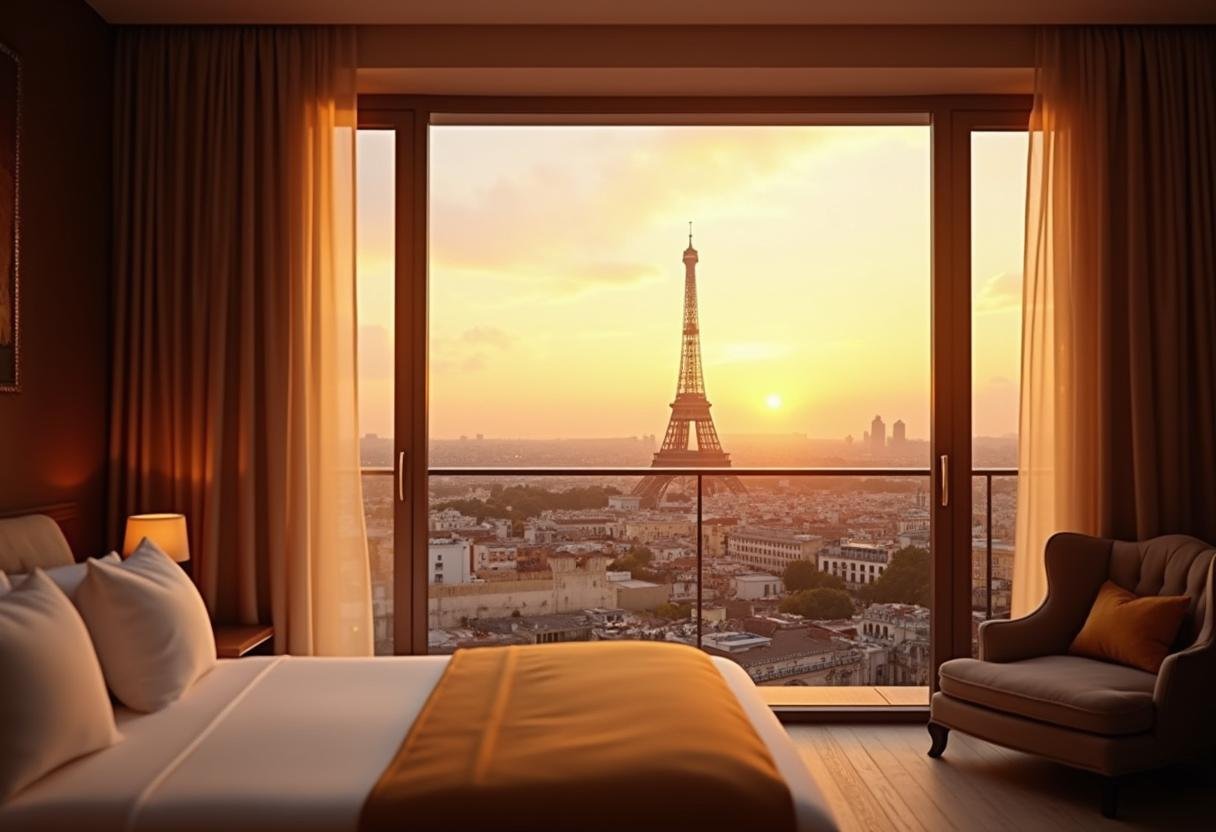Hotels & Accommodations
France, UK, Spain Lead Luxury Hotel Bookings as Italy Slips, US and Canada Hold Strong

Published on
August 8, 2025 |
By: Tuhin Sarkar
France, UK, and Spain lead luxury hotel bookings this year, showing strong growth and global appeal. France, UK, and Spain attract high-end travellers with world-class service, iconic destinations, and premium experiences. At the same time, Italy slips in the rankings, losing its long-held top position to its European neighbours. However, US and Canada hold strong in the luxury segment, maintaining steady demand and market share. France, UK, and Spain continue to capture the hearts of travellers seeking both style and substance. Meanwhile, Italy slips as travel patterns shift, but US and Canada hold strong by offering exclusive experiences and consistent service. This shift marks a new balance in global luxury hospitality. France, UK, and Spain are now shaping the future, while Italy slips behind, and US and Canada hold strong against changing travel trends.
France is back at the top of Europe’s luxury travel map. In July, Global Travel Collection (GTC) data revealed a 64% year-over-year jump in luxury hotel bookings across the country. Paris, Nice, and Marseille led the surge, marking the first time France has outpaced Italy in recent years. The figures show shifting traveller demand, with high-spending clients seeking diverse European destinations instead of concentrating solely on one country. For the first time since 2019, France’s allure has overtaken Italy’s long-standing dominance.
France Sees Record Growth in Luxury Travel
Global Travel Collection advisors in the US and UK recorded a dramatic increase in bookings for France this summer. Paris, with its timeless charm, was the clear favourite, clocking 2,710 booked nights. Nice followed with 1,313 nights, while Marseille recorded 286 nights. This growth signals that travellers are not only flocking to iconic capital cities but also to coastal and cultural hubs. France’s performance this summer underscores a post-pandemic trend—luxury travellers are willing to spend more for authentic, high-end experiences in varied locations.
The Hotels Leading France’s Luxury Boom
Among the most sought-after hotels was Le Bristol Paris, part of the prestigious Oetker Collection, celebrated for its Parisian elegance. In the south, The Maybourne Riviera, dramatically perched over the Mediterranean, became a magnet for ultra-wealthy travellers. These properties highlight the increasing preference for exclusive service, prime locations, and exceptional amenities. With average daily rates hitting $1,400, GTC’s clientele is clearly prioritising quality and uniqueness over price sensitivity, reshaping the European luxury accommodation market.
GTC’s Global Reach and Spending Power
In 2024 alone, GTC advisors generated $2.3 billion in luxury travel sales, organising trips to 179 countries. The network planned nearly 900 ultra-luxury journeys, each valued at over $100,000. These figures reflect the influence of curated, high-touch travel experiences in the luxury segment. For France, this translates into higher spending per trip, longer stays, and greater demand for personalisation—elements that reinforce its status as a premier destination for affluent travellers.
How France Defines True Luxury
France uses a clear and official system to rank its hotels. Atout France, the national tourism agency, awards between one and five stars based on service, comfort, and facilities. On top of this, it awards the Palace label to five-star hotels that go even further. These hotels must pass a review by experts who look at service, heritage, and the overall guest experience.
The Palace label is rare. Only 31 hotels in the country hold it. These hotels combine beauty, history, and perfect service. Many also offer fine dining restaurants, often with Michelin stars. This makes them popular with guests who want more than just a luxury stay.
Paris: The World’s Capital of Palace Hotels
Paris has the largest group of Palace hotels in one city. It offers a mix of grand landmarks and modern designs. Each has its own style but shares a focus on service and detail.
Some of the most famous include the Four Seasons Hotel George V, known for its Art Deco style and Michelin-starred restaurants. Le Bristol Paris, with its private garden, is another symbol of French elegance. Hôtel de Crillon brings 18th-century charm to the Place de la Concorde. Hôtel Plaza Athénée and Le Meurice mix glamour with strong links to Paris’s fashion and art scenes.
Other modern palaces like La Réserve, Park Hyatt Paris-Vendôme, and The Peninsula Paris show that new luxury can stand beside the historic greats. Together, these hotels keep Paris at the top of the world’s luxury travel market.
The French Riviera: Seaside Glamour and Modern Icons
The Côte d’Azur and Provence are famous for summer holidays filled with sunshine, yachts, and fine dining. This region has some of the most celebrated luxury hotels in Europe.
The Hôtel du Cap-Eden-Roc in Antibes is a true legend, with terraces overlooking the Mediterranean. The Grand-Hôtel du Cap-Ferrat offers clifftop gardens and private pool clubs. In Cannes, the Carlton recently reopened after a major restoration and is already winning top global awards. Nice’s Le Negresco mixes Belle Époque style with museum-level art collections.
Saint-Tropez is home to several Palaces, including Cheval Blanc, Château de la Messardière, and La Réserve Ramatuelle. These hotels combine beach clubs, private villas, and Michelin-starred dining. In the Provence highlands, La Bastide de Gordes and Villa La Coste add art and wine to the luxury mix.
The French Alps: Winter Palaces in the Snow
France’s luxury market is not just for summer. The French Alps, especially Courchevel 1850, have ski-in, ski-out Palace hotels that offer both sport and comfort.
Cheval Blanc Courchevel is a small but highly exclusive property with direct slope access. Les Airelles looks like a fairy-tale castle but offers modern service and dining. Hôtel Barrière Les Neiges blends chalet style with private cinemas and luxury spas. Aman Le Mélézin, part of the global Aman brand, adds its minimalist design to the Alpine setting.
These hotels make winter in France as appealing to luxury travellers as summer on the Riviera.
The Atlantic Coast and Wine Regions: Heritage Meets Wellness
Beyond Paris, the Riviera, and the Alps, France’s luxury map includes the Atlantic coast and wine country.
In Biarritz, the Hôtel du Palais was once Napoleon III’s summer home and still has the feel of imperial elegance. Near Bordeaux, Les Sources de Caudalie combines a vineyard setting with a spa famous for its wine-based treatments. In Champagne, the Royal Champagne Hotel & Spa offers panoramic views of vineyards, while Domaine Les Crayères is a grand château with two-Michelin-star dining. The Loire Valley’s Les Sources de Cheverny gives guests lakes, forests, and château-style rooms.
These hotels give travellers the chance to mix relaxation, food, and history in one trip.
Corsica: Wild Beauty with High-End Comfort
Corsica offers Mediterranean beaches and mountain scenery with a less crowded feel than the Riviera. Casadelmar in Porto-Vecchio has modern design and a two-Michelin-star restaurant. La Signoria near Calvi offers villas with views of both the sea and the hills. These properties mix natural beauty with high-end service, making them ideal for travellers seeking peace and privacy.
The Size and Strength of France’s Luxury Hotel Sector
France has 463 five-star hotels, showing the scale of its high-end offer. The 31 Palaces are the very top of this list. In 2024, luxury and upscale hotels saw better revenue growth than mid-market hotels. Investors spent €2.7 billion on hotels, the most since 2016, with Paris taking most of that total.
Even with global travel shifting, luxury demand stayed strong. Guests at this level are less sensitive to price and more focused on unique experiences. That is why France’s mix of city glamour, coastal resorts, ski retreats, and wine estates works so well.
Recognition Beyond France: Michelin Keys and Global Awards
In 2024, the Michelin Guide launched its “Keys” to rate hotels, just as it does for restaurants. In France, 24 hotels received three Keys, the top level. Another 38 earned two Keys, and 127 earned one Key. This adds another trusted sign for travellers looking for quality stays.
Global awards also shine on France. The Carlton Cannes won Forbes Travel Guide’s five-star rating in 2025 after its renovation. These honours help France keep its image as a leader in the luxury travel world.
Why Luxury in France Keeps Growing
France’s success comes from more than just beautiful buildings. The country blends strong traditions with innovation. Palace hotels honour their history but also invest in updates. The service is deeply personal, with staff trained to anticipate guest needs. Dining is a major part of the experience, with many hotels offering Michelin-starred restaurants.
The variety of locations also helps. Travellers can enjoy Paris in winter, the Alps in ski season, the Riviera in summer, and the wine regions in autumn. This year-round appeal keeps occupancy and rates strong.
The Outlook for 2025 and Beyond
The signs for France’s luxury hotel market are positive. Demand is high in every season, and new investment is coming into both historic and modern properties. Paris is expected to keep its position as the top luxury city, while the Riviera and Provence will remain summer magnets.
The Alps will see continued demand for luxury ski holidays, especially if snow levels remain stable. Wine regions and the Atlantic coast will grow as travellers look for less crowded but still premium experiences. Corsica will keep its niche appeal for those wanting luxury in a wilder setting.
With its Palace label, strong five-star base, and a growing list of global awards, France is likely to remain a leader in luxury travel for years to come. The country’s mix of heritage, style, and service will keep drawing the world’s most discerning travellers.
Italy Slips to Second Place in Luxury Travel
Italy still holds strong appeal, recording 777 booked nights in Rome, 725 in Milan, and 679 in Naples. Rome’s Hotel Eden, Lake Como’s Passalacqua, and Sardinia’s glamorous Romazzino remain client favourites. However, the distribution of travel demand suggests Italy’s once unchallenged dominance has eased. GTC’s latest data points to a more balanced spread of tourism spending across Europe, reducing over-reliance on a single country and allowing other destinations to shine.
UK Holds Third Spot with Steady Growth
The United Kingdom secured third place, with a 13% rise in July bookings over 2024. London continued to attract affluent visitors, particularly to properties like Ham Yard Hotel in Soho, Claridge’s in Mayfair, and Flemings Mayfair. The mix of heritage, urban vibrancy, and exclusive service remains a compelling combination for high-net-worth travellers. This growth reflects the UK’s ability to maintain relevance in a competitive European luxury market.
Spain Joins the Top Five Luxury Destinations
Spain’s July performance earned it a place among the top five destinations for GTC travellers. Barcelona’s hotels, including the Majestic Hotel & Spa, Mandarin Oriental, and Le Meridien, saw strong demand. Madrid’s Four Seasons and Ibiza’s Nobu Hotel Ibiza Bay and Six Senses Ibiza also ranked high. The combination of cultural depth, Mediterranean glamour, and luxury infrastructure is positioning Spain as an increasingly important player in Europe’s high-end travel scene.
France Rises to the Top of European Luxury Travel
France has taken the number one spot in luxury hotel bookings this summer. New figures from the Global Travel Collection (GTC) show that bookings in France grew by 64% in July compared to last year. This is the first time since 2019 that France has beaten Italy in the luxury travel market. The demand is being led by Paris, Nice, and Marseille.
GTC advisors in the United States and the United Kingdom booked 2,710 nights in Paris alone. Nice followed with 1,313 nights, and Marseille recorded 286 nights. This strong growth shows that France is attracting both city and coastal travellers. It is not only the capital that is drawing attention. The French Riviera and the southern ports are also in high demand.
Why France Is Winning Over Global Luxury Travellers
France’s success is the result of a mix of factors. The country has invested heavily in high-end hotels and experiences. Paris remains a centre for art, fashion, and fine dining. Nice and Marseille offer a blend of Mediterranean charm and cultural heritage. Hotels such as Le Bristol in Paris and The Maybourne Riviera in the south provide world-class service and stunning locations.
Another reason is traveller preference. Many luxury travellers want variety and new experiences. After years of Italy dominating, there is now a shift towards exploring other European countries. France offers both the glamour of the city and the calm of the coast, which makes it appealing to a wide range of visitors.
The Power of GTC in Luxury Travel
Global Travel Collection is one of the most influential networks of luxury travel advisors in the world. In 2024, GTC generated $2.3 billion in luxury travel sales. Its clients travelled to 179 countries. The average daily hotel rate for GTC bookings was $1,400. Advisors planned nearly 900 ultra-luxury trips worth over $100,000 each.
These numbers show the buying power of GTC’s clients. Their choices shape trends in the luxury market. When GTC’s data shows France leading, it reflects the preferences of some of the most affluent travellers in the world. This influence also extends beyond Europe, as their bookings impact global hotel revenues.
Italy Slips but Remains a Strong Player
Italy is still a major luxury destination, even though it has fallen to second place. In July, GTC booked 777 nights in Rome, 725 in Milan, and 679 in Naples. These cities remain favourites for high-end travellers. Rome’s Hotel Eden, Passalacqua on Lake Como, and Romazzino in Sardinia are some of the most booked properties.
Italy’s drop in position is not due to a lack of appeal. Instead, it reflects a more balanced spread of demand across Europe. Travellers are still flocking to Italy, but they are also exploring other countries. This change could benefit both Italy and its competitors by easing pressure on overcrowded destinations.
The UK’s Steady Rise in Luxury Bookings
The United Kingdom ranked third in GTC’s July data. Bookings were up 13% compared to the same month last year. London remains a key attraction for luxury travellers. Properties like Ham Yard Hotel in Soho, Claridge’s in Mayfair, and Flemings Mayfair continue to draw high-end guests.
The UK’s appeal lies in its mix of history, culture, and modern luxury. Visitors can enjoy theatre in the West End, shop in Bond Street, and dine in Michelin-starred restaurants. This steady growth shows that the UK is maintaining its place in the European luxury travel market.
Spain Joins the Top Five Luxury Destinations
Spain has made its way into GTC’s top five destinations for July. Barcelona is one of the most popular cities. Hotels like the Majestic Hotel & Spa, Mandarin Oriental, and Le Meridien are in high demand. In Madrid, the Four Seasons is a favourite, while Ibiza’s Nobu Hotel and Six Senses appeal to those seeking beachside luxury.
Spain’s strength is in its diversity. It offers world-class cities, beach resorts, and cultural experiences. This variety makes it an attractive alternative for luxury travellers who want more than one type of holiday in a single trip.
Luxury Hotel Trends Across Europe
The luxury hotel market in Europe remains strong in 2025. While overall hotel performance has been mixed in some months due to high comparison points from 2024, luxury hotels continue to lead in revenue per available room (RevPAR). Even when mid-scale and budget hotels face flat growth, luxury properties still see increases.
In 2024, Europe’s hotel sector saw very few weeks of decline, with luxury hotels often driving the highest gains. France, Italy, the UK, Spain, and Germany all recorded strong RevPAR growth in late 2024, and this trend is continuing in 2025.
The US Luxury Hotel Market Shows Resilience
In the United States, luxury hotels are also outperforming other categories. Year-to-date data through April 2025 shows luxury RevPAR up by 7.1%, while economy hotels grew by less than 1%. Weekly figures this summer show luxury as the only chain scale with consistent RevPAR growth.
High-end travellers in the US are willing to pay more for exclusive experiences. Luxury hotels in major cities and resort destinations are maintaining strong rates, even as some mid-market hotels see softer demand. This resilience is a sign that the top tier of the market is less affected by economic fluctuations.
Canada’s Luxury Travel Momentum
Canada has posted back-to-back months of revenue growth in 2025. In June, RevPAR rose by 4.4%, with an average daily rate of CAD 239.06 and occupancy at 75.6%. While public data does not separate luxury hotels from other categories, the overall strength of the market suggests that premium properties are also benefiting.
Cities like Vancouver, Toronto, and Montreal attract both domestic and international luxury travellers. High-end mountain resorts in Alberta and British Columbia also perform well in summer, offering unique experiences that match the standards of Europe’s luxury destinations.
Why Luxury Keeps Outperforming
Luxury hotels have an advantage in the current travel market. They attract high-spending guests who are less sensitive to price changes. They also offer experiences that cannot be easily replaced—personalised service, prime locations, and exclusive access to cultural or natural attractions.
In Europe, this means cities like Paris and Rome can command rates of over $1,000 per night and still see high demand. In the US and Canada, top-tier properties can sustain strong occupancy even when mid-tier hotels face challenges.
What This Means for 2025 and Beyond
If these trends continue, 2025 will see more investment in luxury hotels, especially in France. New openings in Paris, along the Riviera, and in cultural hubs like Lyon could keep France ahead of its competitors. Italy is likely to innovate and promote lesser-known regions to reclaim the top spot.
Spain and the UK are well-positioned to attract more luxury travellers through unique events, cultural experiences, and seasonal offers. In North America, major cities and exclusive resorts will continue to benefit from strong demand at the top end of the market.
The global luxury travel market is expanding. As more travellers seek high-quality, personalised experiences, the competition between destinations will grow. France’s rise in 2025 is proof that a well-rounded offering of city glamour, coastal beauty, and exceptional service can change the rankings in this competitive sector.
Analysis: A Shift in European Luxury Travel Patterns
The data suggests a significant rebalancing in European tourism. For the first time since 2019, France leads the market, driven by its ability to combine urban sophistication, coastal relaxation, and luxury hospitality. Italy’s slip is less about decline and more about diversification of traveller preferences. The UK and Spain’s strong showings point to an increasingly competitive luxury travel landscape. This shift benefits the wider tourism sector by distributing visitor numbers more evenly and reducing pressure on single destinations.
What This Means for Luxury Travel in 2025
If this trend continues, 2025 could see further expansion in France’s luxury offerings. More investment in high-end coastal resorts, boutique city hotels, and exclusive cultural experiences could follow. Italy is likely to innovate to reclaim the top spot, while Spain and the UK could push to capture greater market share. For travel advisors, these shifts mean more opportunities to craft unique, cross-country itineraries for affluent clients seeking variety, exclusivity, and memorable experiences.
Hotels & Accommodations
Cases booked against 4 hotels

Tirupati: The Food Safety and Legal Metrology department jointly inspected hotels and restaurants and bars in the city on Thursday.
As many as 18 teams of officials of the two departments inspected 36 hotels and collected 35 samples of various food items for examination. While 26 kg of food item that were found unfit for consumption were destroyed.
Joint food controller Poorna Chandra Rao said cases were registered against the management of four hotels and improvement notices were issued to 14 restaurants. Action will be taken as per law after the results of the samples, which were sent for examination, are received, he added.
Hotels & Accommodations
Paris, Nice, And Marseille Dominate Luxury Hotel Bookings In France

Published on
August 8, 2025 |
By: TTW News Desk
France has regained its status as the top choice for luxury hotel bookings in July 2025, according to recent data from the Global Travel Collection. The data reflects bookings made by luxury travel advisors from both the U.S. and the U.K. It shows a 64% year-over-year increase in bookings for France, making it the most popular European destination for high-end travelers. This increase comes as Paris, Nice, and Marseille become the leading cities, pushing Italy into second place for the first time in years.
This shift in interest highlights a growing appeal for French destinations. It is the first time France has outpaced Italy in luxury bookings since 2019. For those looking for the finest accommodations and experiences, the rise in French bookings signals the country’s lasting attraction in the high-end tourism market.
The Rise of France: Paris, Nice, and Marseille Lead
The figures for July 2025 show that Paris remains the crown jewel of French tourism, with 2,710 nights booked in its top luxury hotels. Paris is known for its iconic landmarks, upscale shopping areas, and world-class dining options. These factors continuously attract tourists seeking an exceptional cultural experience. Hotels like Le Bristol Paris, a symbol of elegance, and Oetker Hotels, which provide Parisian sophistication, are favorites among travelers.
Following Paris, Nice ranked second in bookings, with 1,313 nights reserved. Nice is a Mediterranean paradise, celebrated for its stunning coastline, charming streets, and lively French Riviera vibe. Luxury hotels like The Maybourne Riviera, overlooking the Mediterranean Sea, offer guests outstanding views and lavish experiences.
Marseille, the third most popular destination in France for luxury bookings, accounted for 286 nights in July. This historic port city, with its rich cultural background, is becoming a favorite for tourists seeking an authentic Mediterranean experience paired with luxury.
The Italian Competition: Italy Takes Second Place
While France has climbed to the top, Italy remains a major destination for high-end travelers, holding the second position in luxury bookings. Rome, Milan, and Naples were among the most booked cities for luxury stays in Italy, with 777 nights reserved in Rome, 725 nights in Milan, and 679 nights in Naples.
Rome, known for its timeless history and vibrant energy, continues to be a popular choice. Hotels like Hotel Eden, located in the heart of the city, and Passalacqua, on Lake Como’s shores, keep attracting those looking for luxurious, intimate experiences in Italy’s capital.
Milan, recognized as Italy’s fashion and design hub, also brought in a significant number of luxury travelers in July. Romazzino, a Belmond Hotel on Sardinia, is a top pick for those seeking a glamorous getaway.
The U.K. and Spain: Close Contenders in the Rankings
The United Kingdom performed well in the rankings, landing in third place with a 13% increase in luxury bookings compared to July 2024. London is still the main hub for luxury travel, with standout hotels like Soho’s Ham Yard Hotel, the iconic art deco Claridge’s, and the exclusive Flemings Mayfair continuing to draw high-end tourists. These hotels, noted for their unique designs and luxurious services, provide unmatched experiences for travelers visiting the U.K.
Meanwhile, Spain is gaining popularity, with Barcelona and the Balearic Islands emerging as favorites for luxury travelers. Barcelona attracted many high-end visitors, with hotels such as the Majestic Hotel & Spa, Mandarin Oriental Barcelona, and Le Meridien Barcelona being popular choices. Demand for luxury stays in Ibiza also grew, with notable hotels like the Nobu Hotel Ibiza Bay and Six Senses Ibiza leading the way.
The Growing Trend of Balanced European Travel Demand
Increased interest in France has shifted the previous dominance of Italian tourism. Angie Licea, President of Global Travel Collection, notes that the rise in French luxury bookings shows a growing demand for diverse destinations across Europe. For years, Italy led the luxury travel market, but France’s recent growth indicates that travelers are exploring a wider range of European locations.
This trend benefits places like Nice, Marseille, and Reykjavík, which were once overshadowed by well-known Italian cities. The French Riviera and the historic areas of Marseille now have a spot on the luxury travel map, providing new and exciting opportunities for travelers seeking different experiences.
Conclusion: A Positive Shift for European Tourism
The latest data from Global Travel Collection underscores a significant shift in the European luxury travel market. With France rising to the top, led by Paris, Nice, and Marseille, the competition with Italy suggests a positive movement toward more diverse European travel. This trend is encouraging for tourism overall, indicating that travelers are discovering new destinations and spreading their visits more evenly across the continent.
For tourism professionals and travelers, this new dynamic in European luxury tourism offers an exciting future for those seeking the best in high-end accommodations, unique cultural experiences, and stunning scenic views. With France leading in bookings and other countries following, the future of luxury European travel looks bright for both established and emerging destinations.
(Source: Global Travel Collection, Hellenic Chamber of Hotels, U.S. and U.K. Luxury Travel Advisors, Rightmove, Lloyds Bank)
Hotels & Accommodations
Millennium Hotels and Resorts Crowned Singapore’s Most Valuable Hotel Brand for the Second Consecutive Year

SINGAPORE, Aug. 8, 2025 /PRNewswire/ — Millennium Hotels and Resorts (MHR) has once again been named Singapore’s most valuable hotel brand in the Brand Finance Hotels 50 2025 global ranking. Valued at USD 421 million, MHR climbed three positions to rank 31st globally, reaffirming its leadership in the international hospitality landscape and its continued commercial momentum.
This marks the second consecutive year that MHR has been featured in the global top 50, having ranked 34th in the 2024 edition, further cementing its standing as Singapore’s leading hospitality brand on the world stage.
Together with sister brand Copthorne, which recorded a brand value of USD 223 million, the combined brand value of Millennium and Copthorne now stands at USD 644 million, underscoring the strength of the group’s overall portfolio and strategic brand focus.
This accolade reflects MHR’s strategic transformation over the past year – a transformation led by innovation, digital enablement, and guest-centric growth. From the rollout of AI-powered assistants AVA and Ask Millie to full GSTC certification across all Singapore hotels, and a revitalised MyMillennium loyalty programme, the brand continues to lead with relevance in today’s competitive travel landscape. The brand also recently launched M Social Resort Penang in July, with M Social Hotel New York Downtown set to open this October and M Social Hotel Sunnyvale, Florida slated for launch in Q1 2026 expanding its lifestyle offering in key gateway markets.
Kwek Leng Beng, Executive Chairman of City Developments Limited said:
“Developing a strong and reputable brand is my priority. While growing the number of hotels is important, it’s the strength of the brand that drives sustainable growth and differentiates us in a competitive market. My personal vision is to expand our group’s portfolio globally with hundreds of Singapore flags flying in key cities around the world.”
Alex Haigh, Managing Director Asia Pacific, Brand Finance, commented:
“Millennium Hotels and Resorts’ position as one of only two Southeast Asian brands in the global top 50 hotels ranking speaks volumes about its strength in the region. Its focus on smart innovation, sustainability, and guest-centric experiences has not only made it Singapore’s most valuable hotel brand, but also a standout force in the regional hospitality landscape.”
“Being named Singapore’s most valuable hotel brand is a proud moment for us, and a powerful validation of the work our teams have done across the board,” said Kwek Eik Sheng, Executive Director, Millennium Hotels and Resorts. “This recognition reflects the value of our people, affirms our brand strength and supports our long-term vision to build a future-ready hospitality brand that is globally competitive and locally respected.”
Saurabh Prakash, Interim Chief Operating Officer and Chief Commercial Officer, Millennium Hotels and Resorts, added:
“This achievement is the result of deliberate and focused strategy one that is deeply aligned with our Chairman Mr Kwek Leng Beng’s Blue Ocean vision. On the back of MyMillennium being named a winner at the Travel + Leisure Loyalty Awards, this latest recognition further affirms the strength of our brand and loyalty proposition. We are shaping a bold new chapter for Millennium Hotels and Resorts, investing in differentiated experiences across rooms, dining, and loyalty. Our goal is to break category conventions and elevate the brand across all our markets.”
With a presence in over 80 destinations and a growing portfolio of more than 145 hotels, MHR remains firmly on track to support the group’s long-term ambition of scaling to 500 hotels globally through strategic partnerships, market-driven growth, and brand-led innovation.
Millennium Hotels and Resorts (MHR)
Millennium Hotels and Resorts (MHR) is a dynamic, global hospitality group with properties spanning four continents and 80 destinations. With a reputation for excellence, MHR owns, manages, and operates over 145 properties worldwide including in New York, Los Angeles, London, Paris, Dubai, Abu Dhabi, Auckland, Beijing, and Singapore. Its diverse portfolio spans brands including The Biltmore, Grand Millennium, Millennium, M Social, Studio M, M Hotel, Copthorne, and Kingsgate—offering the perfect address for business and leisure travellers who are looking for hospitality experiences that go above and beyond. MHR is a Hong Leong Group subsidiary of Singapore-listed global real estate company City Developments Limited. For more information, visit www.millenniumhotels.com.
MyMillennium
Explore the world and be rewarded with MyMillennium, the global loyalty programme from Millennium Hotels and Resorts. With over 4 million members, MyMillennium allows you to earn and redeem points at over 145 participating hotels across Asia-Pacific, the UK, USA, and the Middle East. Members can earn MyPoints on their stays and dining, and redeem them for rewards like complimentary nights, room upgrades, dining discounts, and more. The programme consists of three membership tiers—Classic, Silver, and Prestige—each offering exclusive perks as members progress. In addition, MyMillennium BIZ offers corporate bookers tailored rewards on their business travels and events, making MyMillennium a versatile and rewarding loyalty programme for both leisure and business travellers.
Sign up at www.millenniumhotels.com/en/programmes/my-millennium/.
-

 Brand Stories3 weeks ago
Brand Stories3 weeks agoBloom Hotels: A Modern Vision of Hospitality Redefining Travel
-

 Brand Stories2 weeks ago
Brand Stories2 weeks agoCheQin.ai sets a new standard for hotel booking with its AI capabilities: empowering travellers to bargain, choose the best, and book with clarity.
-

 Destinations & Things To Do3 weeks ago
Destinations & Things To Do3 weeks agoUntouched Destinations: Stunning Hidden Gems You Must Visit
-

 Destinations & Things To Do2 weeks ago
Destinations & Things To Do2 weeks agoThis Hidden Beach in India Glows at Night-But Only in One Secret Season
-

 AI in Travel3 weeks ago
AI in Travel3 weeks agoAI Travel Revolution: Must-Have Guide to the Best Experience
-

 Brand Stories1 month ago
Brand Stories1 month agoVoice AI Startup ElevenLabs Plans to Add Hubs Around the World
-

 Brand Stories4 weeks ago
Brand Stories4 weeks agoHow Elon Musk’s rogue Grok chatbot became a cautionary AI tale
-

 Brand Stories2 weeks ago
Brand Stories2 weeks agoContactless Hospitality: Why Remote Management Technology Is Key to Seamless Guest Experiences
-

 Asia Travel Pulse1 month ago
Asia Travel Pulse1 month agoLooking For Adventure In Asia? Here Are 7 Epic Destinations You Need To Experience At Least Once – Zee News
-

 AI in Travel1 month ago
AI in Travel1 month ago‘Will AI take my job?’ A trip to a Beijing fortune-telling bar to see what lies ahead | China













You must be logged in to post a comment Login